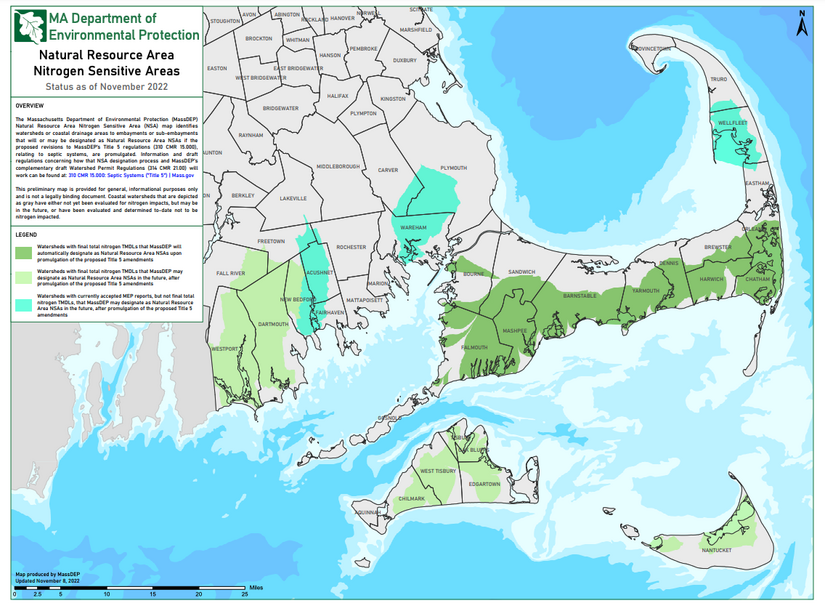DEP Holds Public Hearings on New Title V Regulations
January 12, 2023 Government & Community Affairs

The state Department of Environmental Protection (MassDEP) has proposed changes to existing Title V Regulations and a new permit, called a Watershed Permit.
The new regulations are designed by MassDEP to enhance protection of embayments and estuaries—particularly on Cape Cod, the Islands and Southeastern Massachusetts—from nitrogen pollution originating primarily from wastewater. The proposed amendments will add nitrogen reduction provisions within natural resource areas for Title 5 systems.
MassDEP is also proposing new related regulations to provide a voluntary watershed permitting approach to control nitrogen and other pollutants from entering the embayments and estuaries - for a watershed permit.
These new regulations are part of the proposed lawsuit settlement between the Conservation Law Foundation and MassDEP, the Town of Barnstable, and the Town of Mashpee.
The proposed Title V Regulations would require ALL HOMEOWNERS in the affected areas to upgrade to an Innovative Alternative (IA) septic system within 5 years.
However, a homeowner's septic system will generally be exempt from this mandatory 5-year upgrade if your community seeks and ultimately obtains a Watershed Permit for that watershed.
CCIAOR has been studying and monitoring this proposal for months. We have met with MassDEP twice to express gain a better understanding of the proposal and plan to submit comments through this process.
MASS DEP held public hearings and public information sessions in November and December online and in-person. They extended the public comment period until January 30, 2023 and added additional public information session and public comment sessions.
Public Information Sessions
Remote Only, January 17, at 6 p.m.
Remote and In-Person, January 18 at 6 p.m. at The Marketplace , UMASS Dartmouth
Public Hearings
CCIAOR's Comments on Regulations
The CCIAOR Public Policy Committee has been putting together their official comments. Our ultimate goal is to get to a proposal we support in order to support clean water efforts; however, we do have concerns regarding private property rights and the implementations.
Here are some of CCIAOR's initial comments:
- Support Watershed Permits
We support the creation of a watershed permit as a way to help towns clean up the waterways. DEP has indicated they are using Title V to create this stick approach because that is where their authority lies. However, they are choosing to amend Title V regulations instead of looking for a statutory change for creating a watershed permit.
- Burden is on Homeowner. Financing Not Identified
This places a financial burden on the homeowner for the failure of a town to act. Burden should be placed on the town. The financing tools for homeowners are not identified in the plan and are not in place for immediate help to homeowners.
- No Grandfathering for Recently Installed Title Vs
There is no proposed grandfathering period for homeowners that have recently installed and invested in Title V systems. As such, the requirement for upgrade should be some period of time past installation or at such a time of a failed test.
- 5 Year Time Period is Too Short
If a town failed to get a watershed permit and homeowners would be required to upgrade, we do not see the availability of installers or systems to be able to meet the demand of some of the towns within 5 years. We would encourage a longer period of time to upgrade an entire town to an IA system.
- Allows I/A to be Only Solution
Environmentalists admit that I/A systems are not the only solution for Cape Cod's water quality problem - and not the preferable solution. Towns should be given an out where I/A becomes the only solution. We believe solutions are a range of options that work best for each watershed and this one shoe fits all approach is not the right way to go.
- The Entire Community Benefits from Nitrogen Reduction
The reason for Title V is to ensure a working, safe, and sanitary septic system - an individual benefit. Nitrogen reduction has a community benefit, not an individual homeowner benefit, yet financial burden is being placed on homeowner in this scenario.
